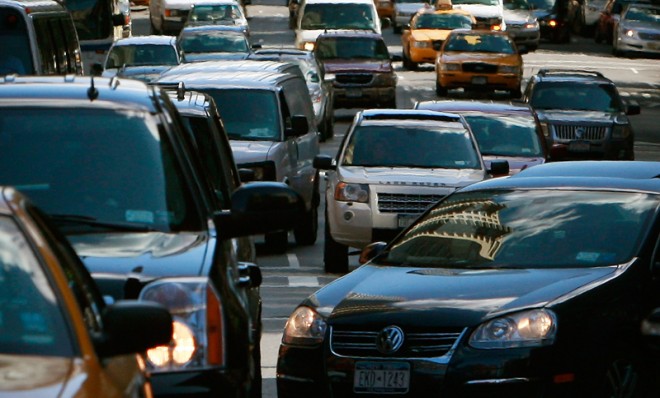Your 45-minute commute is ruining your marriage
And your waistline. And your heart. And your...

A free daily email with the biggest news stories of the day – and the best features from TheWeek.com
You are now subscribed
Your newsletter sign-up was successful
The average American spends about 38 hours a year stuck in traffic.
That's a whole lot of valuable time that could have been spent doing other things that aren't totally eating away at your physical and mental health. Like playing with your kids, training for that 5K you vowed to run, and, perhaps more provocatively, salvaging your love life.
A new study published in the British journal Urban Studies has some bad news for couples who have long-ish commutes: They're much more likely to break up.
The Week
Escape your echo chamber. Get the facts behind the news, plus analysis from multiple perspectives.

Sign up for The Week's Free Newsletters
From our morning news briefing to a weekly Good News Newsletter, get the best of The Week delivered directly to your inbox.
From our morning news briefing to a weekly Good News Newsletter, get the best of The Week delivered directly to your inbox.
The study was conducted by Erika Sandow of Umea University in Sweden, who analyzed a dataset tracking 2 million Swedish households from 1995 to 2005. As was originally suspected back in 2011, Sandow discovered that couples, defined as either married or living together, with 45-minute commutes each way had a 40 percent higher risk of separating than couples with shorter trips.
But, as The Atlantic Cities' Eric Jaffe writes, there are some "notable wrinkles" in the data. For couples who made it past the five-year mark, their relationships actually "proved much stronger," with separation rates comparable to folks with shorter commutes. The rate of separation also dipped considerably if one partner was a long-distance commuter before the relationship was established:
Both these findings suggest that some people may simply acclimate better than others to a long trip into the office. They may also be a sign of what Sandow calls a "customization process" — the development of strategies to handle the stress and strain of long commutes so they don't interfere with a person's home life. [The Atlantic Cities]
While some couples may be better at coping with the anxiety produced by wasting away in bumper-to-bumper traffic, there are still other hazards worth highlighting. A 2012 study in the American Journal of Preventive Medicine found that drivers with longer commutes had higher blood pressure and body-mass indexes than people who lived closer to work. That was partly attributed to an "aggressive, combative, competitive frame for driving," which may be an evolutionary tic, University of Utah psych professor David Strayer told CNN. In other words, it might be better to mellow out.
So, just add the latest findings to the growing body of evidence that our daily commutes are killing us — in more ways than one. Annie Lowrey put it rather nicely in a widely read 2011 essay at Slate:
A free daily email with the biggest news stories of the day – and the best features from TheWeek.com
In summary: We hate commuting. It correlates with an increased risk of obesity, divorce, neck pain, stress, worry, and sleeplessness. It makes us eat worse and exercise less. Yet, we keep on doing it. [Slate]
Sources: The Atlantic Cities, Business Insider, CNN, Slate, Texas A&M